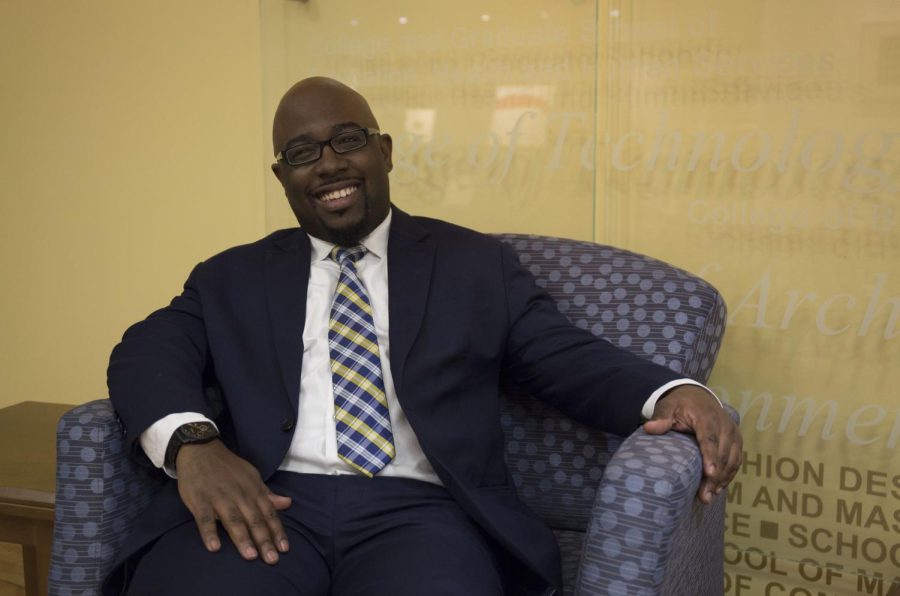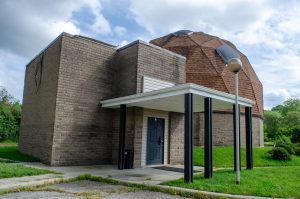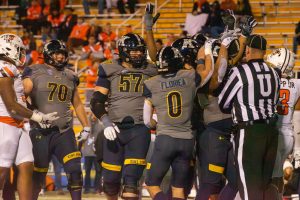Assistant dean of University College strides through challenges
Assistant dean of the University College, N.J. Akbar, poses for a portrait in the Kent State University Library on Friday, Feb. 25, 2017.
February 26, 2017
From being placed in special education classes and struggling with a speech impediment to making major strides in higher education, Kent State’s Assistant Dean of University College N.J. Akbar has accomplished much in his near 10-year career.
Over the last two years, Akbar has received three major awards. One, which he called the most important and humbling, was the Harold K. Stubbs Humanitarian Award, which he received in May 2016.
“I strive to try to bring the voices of students from underrepresented backgrounds to every table and putting it front and center instead of it being a conversation in the margins,” Akbar said. “I was nominated as a humanitarian in the field of education for those things.”
He was nominated by a colleague who observed his work and efforts that he has made over the years. Those same efforts are the ones that led him to the position that he is in today.
“I am still in awe that someone would even think of me as a humanitarian in that way for education,” he said.
In July 2015, he was given the Greater Akron Chambers “30 for the Future” award, which recognized his work as a young professional in the greater Akron area.
This January, he received an award from The Ohio League of Black Women Akron chapter, honoring him as one of the African-American males of significance in the city of Akron.
Shana Lee, director for special projects and initiatives within the Division of Diversity, Equity and Inclusion at Kent State, nominated him for the award.
“I think because I’ve always seen myself as what I like to call ‘the little guy helping the little people.’ Sometimes I have a hard time seeing myself as significant,” Akbar said.
Akbar is a proud product of the Detroit public school system. He was placed in special education because of a lisp and stutter. During this time, he didn’t want to even talk in public or read aloud.
He said the Detroit school system did a great job of making sure his disability was not something that would hinder him.
Akbar went to Eastern Michigan University and obtained a bachelor’s degree in history and English for secondary education. He has a master’s in educational leadership for higher education from Eastern Michigan. He recently completed course work for a Ph.D. in cultural foundations of education and is waiting to take his comprehensive exams.
Akbar credits his parents and grandparents for his success. He said his parents did not have college degrees, but they still always showed him love and support.
His grandfather was the first person who put in his mind that he could go to college, calling him a professor when he was eight years old. Even with a learning disability and speech impediment, his grandfather still envisioned him in a college setting. Akbar said that is something that meant a lot to him that he still holds on to.
Eboni Pringle, dean of University College, has known Akbar for eight years. She hired him for a position as assistant director of Student Success Programs.
“He’s very passionate about allowing students that space to discover who they are,” Pringle said, “and then taking that information and helping them to make the connections between where they’re at right now and where they want to be and resources they need to piece together the larger puzzle of their life.”
Akbar prides himself in being an advocate for students, believing it is an important piece of being a great citizen and leader and feels that advocacy is greater than yourself.
Pringle said she believes that Akbar’s job is a natural fit for him because of the passion he has for his work. He emphasizes to his students that personal accomplishments should be celebrated and that they should not count themselves out.
“I tell my students that we have to celebrate our successes, and I often times have to remind myself of that. There is not many people who can say that they could not read at grade level, and now they are working on getting a Ph.D. Not many people can say they’ve been counted out but have been able to overcome all of their barriers.”
Olivia Williams is the African American student life reporter, contact her at [email protected].















